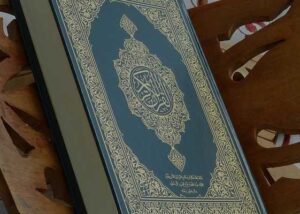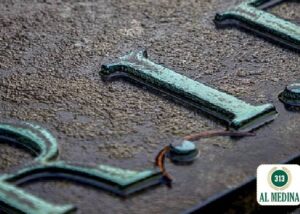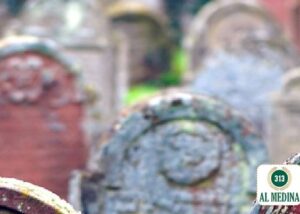There is a Hadith in Shu’ab al-Iman about the dead being like a drowning person. Is it authentic?
Quran
Hadith
Islamic Text
The Hadith in Shu’ab al-Iman about the dead being like a drowning person, has a very weak narrator in it according to Imam al-Dhahabi.
أَخْبَرَنَا أَبُو بَكْرٍ أَحْمَدُ بْنُ مُحَمَّدِ بْنِ إِبْرَاهِيمَ الْأُشْنَانِيُّ، أنا أَبُو عَلِيٍّ الْحُسَيْنُ بْنُ عَلِيٍّ الْحَافِظُ، نا الْفَضْلُ بْنُ مُحَمَّدِ بْنِ عَبْدِ اللهِ بْنِ الْحَارِثِ بْنِ سُلَيْمَانَ الْأَنْطَاكِيُّ، نا مُحَمَّدُ بْنُ جَابِرِ بْنِ أَبِي عَيَّاشٍ الْمِصِّيصِيُّ، نا عَبْدُ اللهِ بْنُ الْمُبَارَكِ، نا يَعْقُوبُ بْنُ الْقَعْقَاعِ، عَنْ مُجَاهِدٍ، عَنْ عَبْدِ اللهِ بْنِ عَبَّاسٍ، قَالَ: قَالَ النَّبِيُّ صَلَّى اللَّهُ عَلَيْهِ وَسَلَّمَ: ” مَا الْمَيِّتُ فِي الْقَبْرِ إِلَّا كَالْغَرِيقِ الْمُتَغَوِّثِ، يَنْتَظِرُ دَعْوَةً تَلْحَقُهُ مِنْ أَبٍ أَوْ أُمٍّ أَوْ أَخٍ أَوْ صَدِيقٍ، فَإِذَا لَحِقَتْهُ كَانَتْ أَحَبَّ إِلَيْهِ مِنَ الدُّنْيَا وَمَا فِيهَا، وَإِنَّ اللهَ عَزَّ وَجَلَّ لَيُدْخِلُ عَلَى أَهْلِ الْقُبُورِ مِنْ دُعَاءِ أَهْلِ الْأَرْضِ أَمْثَالَ الْجِبَالِ، وَإِنَّ هَدِيَّةَ الْأَحْيَاءِ إِلَى الْأَمْوَاتِ الِاسْتِغْفَارُ لَهُمْ ” قَالَ أَبُو عَلِيٍّ الْحَافِظُ: ” وَهَذَا حَدِيثٌ غَرِيبٌ مِنْ حَدِيثِ عَبْدِ اللهِ بْنِ الْمُبَارَكِ، لَمْ يَقَعْ عِنْدَ أَهْلِ خُرَاسَانَ، وَلَمْ أَكْتُبْهُ إِلَّا مِنْ هَذَا الشَّيْخِ “، قَالَ الْإِمَامُ أَحْمَدُ رَحِمَهُ اللهُ: قَدْ رَوَاهُ بِبَعْضِ مَعْنَاهُ مُحَمَّدُ بْنُ خُزَيْمَةَ الْبَصْرِيُّ أَبُو بَكْرٍ، عَنْ مُحَمَّدِ بْنِ أَبِي عَيَّاشٍ، عَنِ ابْنِ الْمُبَارَكِ، وَابْنِ أَبِي عَيَّاشٍ، يَنْفَرِدُ بِهِ، وَاللهُ أَعْلَمُ
(Sayidina) Abdallah ibn Abbas (May Allah Most High be pleased with them both) said, the Prophet ﷺ said, “A dead man in his grave is like a drowning man calling for help. He is waiting for a supplication from a father, a mother, a brother, or a friend to reach him. If it does reach him, then it is dearer to him than the world and what it contains. Indeed Allah Mighty and Majestic sends to those who are in the graves (blessings) the like of mountains, due to the supplication of those who are on the earth. Indeed the gift of the living to the dead is to ask for forgiveness for them.” (Shu’ab al-Iman 7527, Imam al-Bayhaqi).
The above Hadith is narrated in Shu’ab al-Iman by Imam al-Bayhaqi twice, number 7527 and 8855. Both narrations have Muhammad bin Jabir bin Abi Ayaash al-Maseesi. He is a very weak narrator. Therefore the Hadith narrations in Shu’ab al-Iman cannot be authentic.
محمد بن جابر بن أبي عياش المصيصى: لا أعرفه. وخبره منكر جدا. (ميزان الاعتدال)
Muhammad bin Jabir bin Abi Ayaash al-Maseesi: I do not know him. His narration is very reprehensible (Munkar Jidan). (Imam al-Dhahabi, Mizaan al-Itidal).
When a Hadith is very weak it is not permitted to narrate it except in the context of warning people about it. Although scholars of Hadith have permitted the narration of weak Hadith in the context of Fadail, stories etc. This permission does not extend to very weak Hadith.
It is important to note that there is an abundance of authentic Hadith evidence to prove that the living can benefit the dead (Isaal al-Thawab). This Hadith being very weak does not negate the concept of Isaal al-Thawab, since that is established elsewhere. However, this Hadith itself should not be narrated in the context of Isaal al-Thawab or any other context.
Unfortunately many people who speak about Isaal al-Thawab narrate weak or dubious narrations to support it. This is a mistake, since there is an abundance of strong evidence to support this concept. It is misleading to quote weak Hadith when you have strong Hadith to support the issue. And it is always wrong to narrate very weak or baseless Hadith.
And Allah Most High Knows Best
-Answered by Shaykh Noorud-deen (07.02.2022)
See also:
What do the hadith ratings mean.
Hadith about making dua for khatam al Quran
See also (video):






